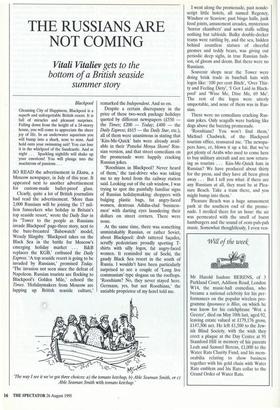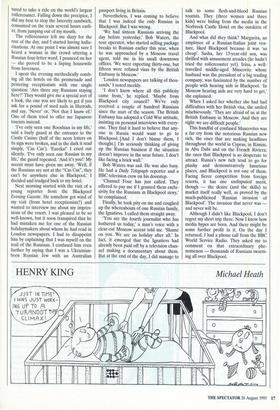THE RUSSIANS ARE NOT COMING
Vitali Vitaliev gets to the
bottom of a British seaside summer story
Blackpool Gleaming City of Happiness, Blackpool is a superb and unforgettable British resort. It is full of miracles and pleasant surprises. Falling down from the height of a 24-storey house, you will come to appreciate the sheer joy of life. In an underwater aquarium you will bump into a shark, nose to nose. And hold onto your swimming suit! You can lose it in the whirlpool of the Sandcastle. And at night . . . Sparkling nightlife will shake up your emotions! You will plunge into the maelstrom of passions...
SO READ the advertisement in Ekstra, a Moscow newspaper, in July of this year. It appeared next to another advertisement for custom-made bullet-proof glass.
Clearly, quite a lot of British journalists had read the advertisement. 'More than 2,000 Russians will be joining the 17 mil- lion funseekers who holiday in Britain's top seaside resort,' wrote the Daily Star in its 'Tower to the people as Russians invade Blackpool' page-three story, next to the bare-breasted `Babewatch' model, Wendy Slingsby. 'Blackpool takes on the Black Sea in the battle for Moscow's emerging holiday market . . . B&B replaces the KGB,' enthused the Daily Express. 'A top seaside resort is going to be invaded by Russians,' promised Today. 'The invasion not seen since the defeat of Napoleon. Russian tourists are flocking to Blackpool's Golden Mile,' echoed the Times. 'Holidaymakers from Moscow are lapping up British seaside culture,' 'The way! see it we've got three choices: a) the tomato ketchup, b) Able Seaman Smith, or c) Able Seaman Smith with tomato ketchup.' remarked the Independent. And so on.
Despite a certain discrepancy in the price of these two-week package holidays quoted by different newspapers (£550 — the Times; £200 — Today; £400 — the Daily Express; £615 — the Daily Star, etc.), all of them were unanimous in stating that `Kiss-Me-Quick' hats were already avail- able in their Totselui Menya Skoref Rus- sian version, and that street comedians on the promenade were happily cracking Russian jokes.
`Rooshians in Blackpool? Never heard of them,' the taxi-driver who was taking me to my hotel from the railway station said. Looking out of the cab window, I was trying to spot the painfully familiar signs of Russian holidaymaking: shoppers with bulging plastic bags, fat angry-faced women, dextrous Adidas-clad 'business- men' with darting eyes laundering their dollars on street corners. There were none.
At the same time, there was something unmistakably Russian, or rather Soviet, about Blackpool: drab tattered façades, scruffy pedestrians proudly sporting T- shirts with silly logos, fat angry-faced women. It reminded me of Sochi, the gaudy Black Sea resort in the south of Russia. I wouldn't have been particularly surprised to see a couple of 'Long live communism'-type slogans on the rooftops. `Rooshians? No, they never stayed here. Germans, yes, but not Rooshians,' the amiable proprietor of my hotel told me. I went along the promenade, past nonde- script little hotels, all named Regency, Windsor or Seaview; past bingo halls, junk food joints, amusement arcades, mysterious 'horror chambers' and news stalls selling nothing but tabloids. Bulky double-decker trams were rattling by, and the sea, hidden behind countless statues of cheerful gnomes and teddy bears, was giving out periodic deep sighs, in true Russian fash- ion, of gloom and doom. But there were no Russians.
Souvenir shops near the Tower were doing brisk trade in baseball hats with logos like: '100 per cent Bitch', 'Over Thir- ty and Feeling Dirty', 'I Got Laid in Black- pool' and 'Wine Me, Dine Me, 69 Me'. The rest of the logos were utterly unquotable, and none of them was in Rus- sian.
There were no comedians cracking Rus- sian jokes. Only seagulls were barking like dogs above the buzzing promenade.
`Rooshians? You won't find them,' Michael Chadwick, of the Blackpool tourism office, reassured me. 'The newspa- pers have, er, blown it up a bit. But we've got plenty of Arabs who used to come here to buy military aircraft and are now return- ing as tourists . . . Kiss-Me-Quick hats in Russian? We have produced about thirty for the press, and they have all been given away . . . But I tell you what: if there are any Russians at all, they must be at Plea- sure Beach. Take a tram there, and you might bump into them.'
Pleasure Beach was a huge amusement park at the southern end of the prome- nade. I strolled there for an hour: the air was permeated with the smell of burnt hamburgers and the sound of oom-pah-pah music. Somewhat thoughtlessly, I even ven- tured to take a ride on the world's largest rollercoaster. Falling down the precipice, I did my best to stop the Intercity. sandwich, consumed on the train several hours earli- er, from jumping out of my mouth.
The rollercoaster left me dizzy for the rest of the day, and I started having hallu- cinations. At one point I was almost sure I heard a woman in the crowd uttering a Russian four-letter word. I pounced on her — she proved to be a lisping housewife from Inverness.
I spent the evening methodically comb- ing all the hotels on the promenade and pestering receptionists with one single question: 'Are there any Russians staying here?' They would give me a special sort of a look, the one you are likely to get if you ask for a pound of used nails in Harrods, and say, 'Never' or, 'Not that I know of.' One of them tried to offer me Japanese tourists instead.
'I've only seen one Rooshian in my life,' said a burly guard at the entrance to the Castle Casino (half of the neon letters on its sign were broken, and in the dark it read simply, `Cas Cas'). 'Eureka!' I cried out silently. 'I've only seen one Russian in my life,' the guard repeated. 'And it's you!' My accent must have given me away. 'Well, if the Russians are not at the "Cas Cas", they can't be anywhere else in Blackpool,' I decided and trudged back to my hotel.
Next morning started with the visit of a young reporter from the Blackpool Evening Gazette. He somehow got wind of my visit (from hotel receptionists?) and wanted to interview me about my impres- sions of the resort. I was pleased to be so well-known, but it soon transpired that he had mistaken me for one of the Russian holidaymakers about whom he had read in London newspapers. I had to disappoint him by explaining that I was myself on the trail of the Russians. I confused him even further by saying that I was a Ukrainian- born Russian Jew with an Australian passport living in Britain.
Nevertheless, I was coming to believe that I was indeed the only Russian in Blackpool. But I was wrong.
'We had sixteen Russians arriving the day before yesterday,' Bob Waters, the tour operator, who started selling package breaks to Russian earlier this year, when he was approached by a Moscow travel agent, told me in his small downtown offices. 'We were expecting thirty-one, but fifteen were refused visas by the British Embassy in Moscow.'
'London newspapers are talking of thou- sands,' I noted meekly.
'I don't know where all this publicity came from,' he replied. 'Maybe from Blackpool city council? We've only received a couple of hundred Russians since the start of the season. The British Embassy has adopted a Cold War attitude, insisting on personal interviews with every- one. They find it hard to believe that any- one in Russia would want to go to Blackpool. [And I don't blame them, I thought.] I'm seriously thinking of giving up the Russian business if the situation doesn't improve in the near future. I don't like facing a brick wall.'
Bob Waters was sad. He was also busy. He had a Daily Telegraph reporter and a BBC television crew on his doorstep.
'Channel Four has just called. They offered to pay me if I granted them exclu- sivity for the Russians in Blackpool story,' he complained.
Finally, he took pity on me and coughed up the whereabouts of one Russian family, the Ignatievs. I called them straight away.
'You are the fourth journalist who has bothered us today,' a man's voice with a clear-cut Moscow accent told me. 'Shame on you. We are on holiday after all.' In fact, it emerged that the Ignatievs had already been paid off by a television chan- nel making a documentary about them. But at the end of the day, I did manage to talk to some flesh-and-blood Russian tourists. They (three women and three kids) were hiding from the media in the Norbreck Castle Hotel on the outskirts of Blackpool.
And what did they think? Margarita, an employee of a Russian-Italian joint ven- ture, liked Blackpool because it was 'so cheap'. Sasha, her 13-year-old son, was thrilled with amusement arcades (he hadn't tried the rollercoaster yet). Irina, a well- travelled middle-aged Muscovite whose husband was the president of a big trading company, was fascinated by the number of people with hearing aids in Blackpool. 'In Moscow hearing aids are very hard to get,' she explained.
When I asked her whether she had had difficulties with her British visa, she smiled mischievously. 'They are afraid of us at the British Embassy in Moscow. And they are right: we are difficult people.'
This handful of confused Muscovites was a far cry from the notorious Russian new rich, the ones that are making headlines throughout the world in Cyprus, in Rimini, in Abu Dabi and on the French Riviera; the ones that Blackpool is so desperate to attract. Russia's new rich tend to go for plushy and demonstratively luxurious places, and Blackpool is not one of them.
Facing fierce competition from foreign resorts, it has one undisputed merit, though — the desire (and the skills) to market itself really well, as proved by the much-publicised 'Russian invasion of Blackpool'. The invasion that never was — and never will be.
Although I didn't like Blackpool, I don't regret my short trip there. Now I know how media hypes are born. And there might be some further profit in it. On the day I returned, I had a phone call from the BBC World Service Radio. They asked me to comment on that extraordinary phe- nomenon — thousands of Russians swarm- ing all over Blackpool.



















































 Previous page
Previous page